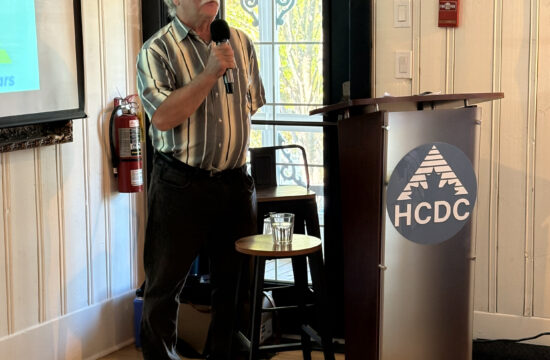By Adam Frisk
Haliburton Village is a step closer to installing two new electric vehicle (EV) charging stations, providing drivers with more options to top up their batteries.
EV drivers in the county may soon see two dual, Level 3 EV charging stations installed on Maple Ave. in the parking lot across from Dysart et al municipal building. That’s because the municipality reached an agreement with Lakeland EV Charging to allow it to lease four parking spaces from the township to install the charging stations.
But for that to happen, Lakeland EV Charging still needs approval in funding.
“We’ve had a really incredible opportunity come to us recently, the Natural Resources of Canada’s Zero Emission Vehicle Infrastructure Program had a round of applications open late last year,” Peter Ewald, director of Lakeland Solutions, presented on Tuesday during a regular council meeting.
Ewalde explained to council that Lakeland Solutions submitted two group applications to the program, with one being approved immediately and the other denied. However, Natural Resources of Canada advised the company that there was still some funding left in the program and moved the second application into the approval process.
“So we’ve got some more funding available,” Ewalde said. “And this funding is actually for a Level 3 EV charging, so it’s a faster charge.”
Lakeland, along with Environment Haliburton, had previously presented to council earlier this year a plan to install Level 2 charging stations in the town through an application of funding from Aviva Canada. Council approved the plan, but the funding application was denied.
“The faster charging, as vehicles are getting larger batteries and can charge faster, is what the consumers are asking for,” Ewalde explained.
Both parties had previously discussed and determined that the parking lot across from the municipal building is the most advantageous location for the stations.
Similar to the proposal earlier this year, Lakeland would cover all costs associated with the installation, maintenance, and operation of the two charging stations, requiring zero investment from the municipality.
“All we’re asking is for Dysart et al to provide some land,” Ewalde said.
EV drivers would be charged on a per-kilowatt-hour basis for the electricity used, and all service and support would be handled by the company.
In exchange for leasing the four parking spots and space for the infrastructure, the municipality would receive “special charging rates for future fleet electric vehicles.”
Lakeland proposed a 12-year lease with two five-year extensions. The municipality would be required to continue clearing the parking spaces of snow and enforce the current parking bylaws for the spaces.
The municipality agreed, in part, to lease the parking area “on the condition that no public funds are spent on the installation and maintenance of the stations” should Lakeland secure the funding. Lakeland was facing an Oct. 15 deadline to submit its application.












